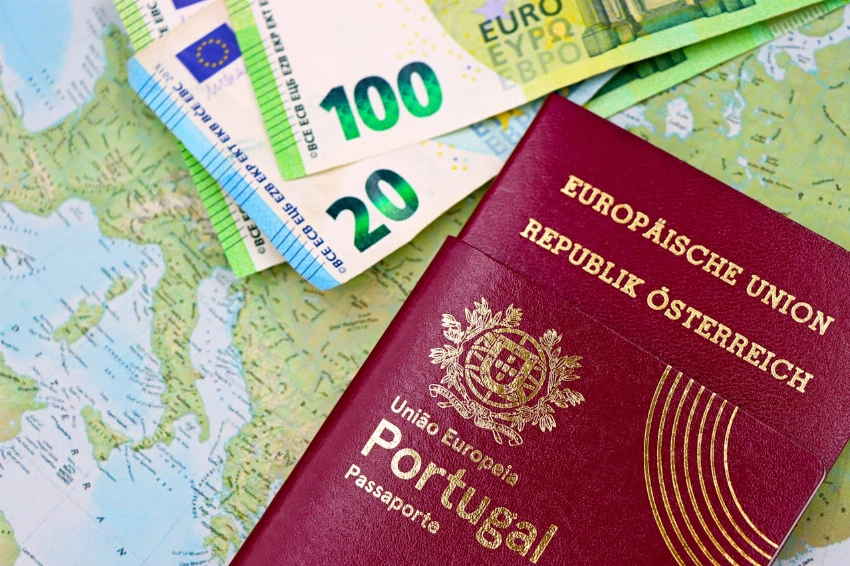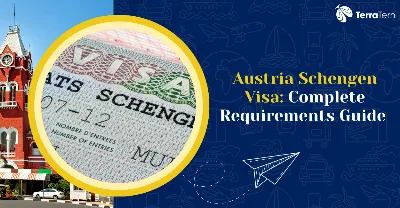Key Highlights
- What Is an Austria Schengen Visa, and Why Do Indians Need It in 2025?
- What Are the Complete Austria Schengen Visa Requirements for Indians in 2025?
- What Are the Austria Schengen Visa Photo Requirements and Specifications for Indians in 2025?
- How Much Does Austria Schengen Visa Cost for Indians in 2025?
- How Long Does Austria Schengen Visa Processing Take if You Apply from India in 2025?
- How to Apply for an Austrian Schengen Visa: A Step-by-Step Process for Indians in 2025
- What Are Common Austria Schengen Visa Interview Questions? Latest Update 2025
- What Happens If Your Austria Schengen Visa Gets Rejected? Experts' Insights & Tips in 2025
- What Are the Austria Visa Travel Insurance Requirements for Indians in 2025?
- Conclusion
If someone wishes to visit the beautiful nation of Austria as a tourist, businessman, or family member, then, in 2025, obtaining an Austria Schengen Visa would be the only way to enter and travel within the Schengen Area legally. The Austrian Schengen visa checklist outlines the details of all required documents, including a completely filled-out form, biometric passport photos, flight insurance, proof of funds, and a travel itinerary, which the applicant must submit. Appropriately preparing for an Austria Schengen visa and having essential receipts, such as a current passport, health insurance, hotel bookings, and accounting documents, will not only count for a better acceptance of the right visa but will also make visa issuance easier for all the visitors.
What Is an Austria Schengen Visa, and Why Do Indians Need It in 2025?

-
The Austrian Schengen visa is a type C visa, which allows Indian citizens to travel to Austria and visit all 27 members of the Schengen area with a maximum validity of 90 days for a stay of up to 180 days, without the need to apply for individual visas for each member.
-
An Austria Schengen visa is mandatory for any visit, be it a tourist visa, a business visa, visiting family, or an education visit for a short stay period. And all applicants have to go through the checklist before applying.
-
Some basic requirements for applying are - a valid passport of one country outside the European Union with at least 10 years of remaining in it with a date of return of more than the validity of Schengen visa, travel health insurance for all Schengen with a personal amount of at least 30 000 Euros, proof of the financial means, comprehensive Austrian Schengen visa requirements of visit bookings and hotels.
-
The visa includes movement around the Schengen area and free travel - Belgium, Croatia, Czechia, Denmark, Germany, Estonia, Greece, Spain, France, Italy, Latvia, Lithuania, Luxembourg, Hungary, Malta, the Netherlands, Poland, Portugal, Slovenia, Slovakia, Finland, Sweden, Iceland, Liechtenstein, Norway, and Switzerland.
-
For Indian applicants, it is said that the optimal interval during which the timeline will be processed is between 15 and 30 calendar days.
Also Read: Austria Study Visa - Charting A Course To Excellence
What Are the Complete Austria Schengen Visa Requirements for Indians in 2025?
The official requirements for the Austrian Schengen visa 2025 are outlined in Austria, as defined in the Vienna system. All official documents, including purpose-specific requirements, are verified by VFS Global portals and government checklists. Applicants should take all the documents in the order of the visa checklist and have formats and documents for awardees of recognized current Schengen standards.
What Are the Essential Documents Every Applicant Needs?
The essential documents every applicant needs for the Austrian Schengen visa requirements are as follows:
Step 1: Passport: (must be issued within the last 10 years and be valid at least for three months after the date of departure from Schengen, as well as a minimum of two blank pages are required for the issuance of the visa, and it is included in the checklist.
Step 2: Application Form: Complete and sign the form with corresponding signatures and all fields filled in (use "N/A" where not applicable), in accordance with requirements for orderly submission of documents.
Step 3: Photos: Recent ICAO-compliant color photos, 35 x 45 mm, the size prescribed by Austrian authorities for the Austrian Schengen visa, as reflected in the Austrian Schengen visa checklist.
Step 4: Travel Insurance: A policy that covers the entire Schengen Area with a minimum coverage amount of EUR 30,000, including medical repatriation, as required by the core requirements.
Step 5: Financials and Trip Proof: Recent proof of funds, confirmed accommodation, and flight/bus/train reservations, compiled with other documents per Austrian 2025 instructions
What Additional Documents Are Required by Visa Type?
Additional documents required by visa type are as follows:
-
Tourist [Type C]: Prepaid Hotel Booking, Round Trip Tickets, Dated Schedule, Consume Date Official Covering Letter Given For Alignment With The Purpose Of The Tour, And Confirming Booking In Hotels.
-
Business: Invitation letter from an Austrian company, an employer letter indicating designation and leave, registration for this event (if applicable), and proof of business ties, attached to the core documents
-
Student/Short Study: University admission/confirmation, confirmation of funds accessible from Austria, accommodation confirmation, e.g,. Dorm confirmation, insurance valid with accommodation in accordance with Austrian 2025: Dienstrecht Schengen Visa.
-
Airport transit (Type A) or Transit by way of Schengen: Onward ticket confirmed, valid visa for final destination (if required), timings/PNR for onward journey, and for final destination in accordance with the checklist.
-
Visiting Family/Friends: Formal invitation/supporting proof of relation & residence of host & assurance of accommodation to be provided, to be attached to the universal Austria Schengen visa documents set
What Are the Austria Schengen Visa Photo Requirements and Specifications for Indians in 2025?

A photo in a 35x45 mm portrait format, a set of recent, correctly colored, and well-lit images with a neutral expression, and a size that considers the correct proportion for compliance with visa requirements at VFS. These specifications are part of the visa checklist. They must be included together with the Austrian Schengen visa papers to complete the Austrian Schengen visa application file.
What Are the Exact Photo Dimensions and Quality Standards?
The photographic dimensions and standards for Austrian Schengen visa requirements are as follows.
-
Size and Count: 35 mm x 45 mm (1.38 x 1.77 inches) 2 identically sized recent color photos Austria Schengen for recent color x China / Austria per checklist requirements & Name, age, residency, diplomatic mission Austria Visa Embassy Rules, etc.
-
Background and Color: Solid, non-patterned white or light grey background with good contrast; no shapes, objects, or shadows to satisfy requirements and ensure Austria Schengen visa documents
-
Head Position and Size: Face on, eyes open, neutral expression; head and face roughly 70-80% of the image (height: approx. 32-36 mm), according to guidelines for the visa.
-
Print Quality: Sharp, well-exposed, no creases, stains, or pixels, high photo paper prints acceptable VFS for documents checklist.
-
Personal Effects and Clothing: No hats or headgear (except for religious reasons with a visible face); glasses (only necessary for medical reasons), provided that they don't have a reflective surface, such as tinted glasses or sunglasses.
What Common Photo Mistakes Should Be Avoided?
Common photo mistakes that should be avoided are as follows:
-
Incorrect dimensions or crop (anything other than the exact dimensions of 35 x 45 mm, 1.38 x 1.77 inches) will be refused.
-
Non-neutral expressions, such as showing or hugging the inclination, closed eyes, or being apart from the concentrated face, violate those ICAO requirements for the Austrian Schengen visa.
-
Colored, textured backgrounds, harsh lighting, absorption: Austria's guardians of hardship that break the visa requirements, resubmit the visa.
-
Glasses with glare, thick frames, covering eyes, tinted lenses that fail the visa, and biometric quality controls of the Austrian Schengen visa. Austrian Schengen visa checklist.
-
Old photograph(s) (over 6 months), extensive retouching/filters, damaged photograph(s) - all of which cause rejections under visa requirements for documents at the VFS.
Also Read: Austria Visa Photo Requirements, Size and Rules Guide
How Much Does Austria Schengen Visa Cost for Indians in 2025?
For Indians in 2025, the Austria Schengen visa fees are based on the EU's uniform Schengen short-stay fee, with adults paying EUR 90 and children (aged 6-11 years) paying EUR 45. Children below 6 are free. VFS Global collects fees in INR, based on the Consular Exchange rate and center-specific service charges & optional add-ons apply as shown below.
|
Category |
Embassy Fee (EUR) |
Embassy Fee (INR) |
VFS Service Charge (INR) |
Total Cost (INR approx.) |
Notes |
|
Adult (Tourist/Business) |
€80 |
INR 7,080–INR 7,200 |
INR 2,274 |
INR 9,354–INR 9,474 |
Standard Austria Schengen visa for Indians |
|
Children (6–12 years) |
€40 |
INR 3,540–INR 3,600 |
INR 2,274 |
INR 5,814–INR 5,874 |
Reduced embassy fee according to the visa requirements |
|
Children (under 6 years) |
Free |
INR 0 |
INR 2,274 |
INR 2,274 |
Embassy fee waived; VFS charge applies per visa checklist |
|
Transit Visa (Type A) |
€80 |
INR 7,080–INR 7,200 |
INR 2,274 |
INR 9,354–INR 9,474 |
Same as an adult short-stay Austria Schengen visa |
|
Students/Research scholars |
€80* |
INR 7,080–INR 7,200* |
INR 2,274 |
INR 9,354–INR 9,474 |
*May be exempt if enrolled in EU programs per the Austrian Schengen visa documents |
What Are the Embassy Fees vs Service Charges?
The Difference between the embassy fee and the service charge is as follows:
|
Fee Component |
Amount (EUR) |
Amount (INR approx.) |
Payable To |
Mandatory/Optional |
Notes |
|
Embassy Visa Fee (Adult) |
€80 |
INR 7,080–INR 7,200 |
Austrian Embassy/Consulate |
Mandatory |
Core Austria Schengen visa fee; non-refundable |
|
Embassy Visa Fee (6–12 yrs) |
€40 |
INR 3,540–INR 3,600 |
Austrian Embassy/Consulate |
Mandatory |
50% reduction in Austria Schengen visa requirements |
|
VFS Service Charge (India) |
— |
INR 2,274 |
VFS Global |
Mandatory |
Covers application handling; increased Sept 2025 |
|
Courier Return Fee |
— |
INR 930–INR 1,400 |
VFS Global |
Optional |
Passport delivery to the applicant's address per the Austria Schengen visa checklist |
|
SMS Alert Service |
— |
INR 450 |
VFS Global |
Optional |
Application status updates via SMS for Austria Schengen visa documents |
|
Premium Lounge Access |
— |
INR 4,600 |
VFS Global |
Optional |
Faster document checks vary by city for the Austrian Schengen visa |
|
Photo Service |
— |
INR 200–INR 300 |
VFS Global |
Optional |
On-site biometric photo if Austria Schengen visa requirements are not met in advance |
|
Combo Service (SMS + Courier) |
— |
INR 1,250 |
VFS Global |
Optional |
Bundled value-added services for the Austrian Schengen visa |
Which Categories Get Fee Exemptions or Discounts?
Categories that get Fee Exemptions or Discounts are as follows:
-
Children under 6 Years: Fully exempt from the €80 embassy fee for the visa, but still pay VFS service charges (approximately INR 2,274), making the total cost around INR 2,274 per the visa checklist.
-
Children Aged 6–12 years: Receive a 50% discount with embassy fees reduced to €40 (approximately INR 3,540–INR 3,600) plus VFS charges (INR 2,274), totaling INR 5,814–INR 5,874 for all visa documents per requirements.
-
Students and Pupils: Under 25 years old visiting for study, educational training, or school trips qualify for complete embassy fee waivers (€0) for the Austrian Schengen visa. However, VFS charges apply, as outlined in the Austrian Schengen visa checklist.
-
Researchers and Academics: Scientists and researchers with invitation letters or declarations of guarantee from Austrian institutions are exempt from embassy fees (€0) for both short-stay and residence visas under the requirements, simplifying the documents.
How Long Does Austria Schengen Visa Processing Take if You Apply from India in 2025?
Austria Schengen visa processing takes the following steps:
-
Standard Processing Timeline: The visa typically takes 15 calendar days from the date of biometric submission for Indian applicants, though Austrian consulates reserve up to 30 calendar days for complete review of all Austrian Schengen visa documents.
-
Extended Processing Periods: In cases requiring additional verification, security checks, or incomplete requirements, processing may be extended to 45 calendar days, and in exceptional circumstances, up to 60 days for the visa.
-
Peak Season Delays: Applications submitted during the summer (June–August) and winter holidays (December–January) often experience longer wait times due to high volumes, which can push visa processing beyond the 30-day maximum, even if the applicant meets the visa checklist.
-
Fast-Track Options: Although no official expedited processing exists for the Austrian Schengen visa, completing error-free visa documents, pre-booked VFS appointments during off-peak hours, and prior biometric enrollment (valid for 59 months) can reduce overall timelines, as outlined in the Austrian Schengen visa checklist.
What Factors Can Delay Austria Visa Processing?
Factors that can delay Austria visa processing are as follows:
-
Incomplete or Incorrect Austria Schengen Visa Documents: Missing pages, unsigned forms, expired passports (with less than three months' validity), or non-compliant photos result in automatic rejections and delays in resubmission under requirements, as outlined in the visa checklist.
-
Insufficient or Unverifiable Financial Proof: Bank statements older than 30 days, unexplained large deposits, or funds below recommended levels (€50–€100/day) trigger additional scrutiny and delay the approval process.
-
Inconsistent Travel Plans or Itinerary Gaps: Mismatched flight dates, missing accommodation bookings, or unclear trip purposes raise red flags, requiring consular interviews and extending Austria Schengen visa processing beyond standard timelines.
-
Previous Visa Refusals or Overstays: Prior Schengen rejections, overstay records, or incomplete travel history necessitate mandatory background checks and verification, which can extend visa timelines to 45–60 days.
-
Peak Season Application Volumes: The summer (June–August) and December holiday rushes create appointment backlogs at VFS centers and Austrian consulates, resulting in delays for biometric enrollment and final Schengen visa decisions for Austria, despite the submission of complete Schengen visa documents.
How Can You Track Your Austria Visa Application Status?
To track your Austria visa application status, follow these steps:
-
VFS Global Online Tracking Portal: Enter your reference/acknowledgment number and passport details on the VFS Austria tracking page to view real-time status updates for your visa, including document receipt, consulate submission, and decision stages.
-
SMS and Email Alerts: Opt for VFS SMS service (INR 450) during submission to receive automatic notifications when your visa reaches key milestones—biometrics recorded, under consular review, decision made, and passport ready for collection—ensuring compliance with requirements.
-
Reference Number and Receipt: Your unique VFS reference number (printed on the acknowledgment slip) is mandatory for all tracking queries related to Austrian Schengen visa documents. Please retain it until your passport returns, to verify the checklist.
-
Passport Collection Timeline: Once the decision status changes to "Ready for Collection," passports with the visa or refusal letter are available at the VFS center within 1–2 business days, or via courier (if opted) within 3–5 days, completing the process.
Also Read: The Most Common Schengen Visa Rejection Reasons
How to Apply for an Austrian Schengen Visa: A Step-by-Step Process for Indians in 2025
The Austrian Schengen visa step-by-step process is as follows:
-
Prepare Complete Austria Schengen Visa Documents (Days 1–3): Gather all items from the checklist—valid passport, completed application form, two 35x45mm photos, travel insurance with €30,000 coverage, bank statements (last 3 months), flight bookings, hotel confirmations, and supporting letters—ensuring each meets requirements.
-
Book VFS Global Appointment Online (Days 4–7): Visit the VFS Global Austria website, create an account, select your nearest center (Delhi, Mumbai, Bangalore, Chennai, Kolkata, Hyderabad, or Pune), choose an available slot (preferably 15–30 days before travel), pay the service charge (INR 2,274), and receive confirmation email with reference number for the visa per the
-
Attend Biometric and Submission Appointment: Arrive 15 minutes early with all original documents plus photocopies, undergo fingerprint scanning and photo capture (takes 5–10 minutes), submit your file to VFS staff for verification, pay embassy fees (€80 for adults, approximately INR 7,080–INR 7,200), and collect acknowledgment receipt with tracking number aligned with requirements.
-
Track Application Status: Monitor your progress via the VFS tracking portal using the reference number, expect status updates like "Application received," "Under process at consulate," and "Decision made," with standard processing taking 15 calendar days (up to 30 days during peak seasons) as noted in the checklist.
-
Collect Passport with Visa Decision: Once status shows "Ready for collection," visit your VFS center with acknowledgment receipt and ID to retrieve your passport containing the visa sticker (or refusal letter), verify all details match your documents immediately, and confirm visa validity dates, duration, and entry type before travel.
Where Can You Submit Austria Visa Applications in India?
Austria Visa Applications in India are as follows:
-
VFS Global New Delhi: Shivaji Stadium, Connaught Place, New Delhi 110001; handles applications for North India residents seeking an Austrian Schengen visa, with complete verification of the Austrian Schengen visa checklist
-
VFS Global Mumbai: Marathon Futurex, Lower Parel, Mumbai 400013; processes documents for Maharashtra, Gujarat, and Goa applicants with biometric facilities meeting requirements.
-
VFS Global Bangalore: Raheja Towers, M.G. Road, Bangalore 560001; serves Karnataka and Kerala residents submitting the checklist and all required documents.
-
VFS Global Chennai: Shama Centre, Anna Salai, Chennai 600002; accepts applications from Tamil Nadu, Andhra Pradesh, and Telangana for the visa.
-
VFS Global Kolkata, Hyderabad, and Pune centers: Additionally operate to serve Eastern, South-Central, and Western applicants, respectively, all processing documents per the official checklist and requirements with identical procedures.
What Happens During the Biometric Appointment?
The biometric appointment is as follows:
-
Document Verification and Submission: VFS staff review your documents against the checklist, verifying completeness, validity, signatures, and compliance with requirements—this process takes 10–15 minutes before biometric capture begins.
-
Fingerprint Scanning (all ten digits): Digital capture of all fingerprints using electronic scanners, stored for 59 months in the Visa Information System (VIS) and reusable for future applications, eliminating repeat biometrics within this validity period per requirements.
-
Facial Photograph Capture: VFS takes a live digital photo meeting ICAO standards (distinct from the submitted 35x45mm photos) for biometric verification on the Austrian Schengen visa sticker, ensuring consistency with Austrian Schengen visa documents in the Austrian Schengen visa checklist.
-
Fee Payment and Receipt: Pay embassy fees (€80/€40/free depending on category, approximately INR 7,080–INR 7,200 for adults) plus any optional services (courier INR 930, SMS INR 450) via card/cash, receive stamped acknowledgment with reference number for tracking the visa.
What Are Common Austria Schengen Visa Interview Questions? Latest Update 2025

Common Austria Schengen visa interview questions are as follows:
-
Purpose and Itinerary Queries: Expect detailed questions like "Why are you visiting Austria?", "What cities will you visit?", "How long do you plan to stay?" and "Do you have a detailed day-by-day itinerary?" require consistent answers that match your documents and trip bookings.
-
Financial Capability Questions: Consular officers ask, "Who is funding your trip?", "What is your monthly income?", "Can you show proof of sufficient funds?", and "Do you have sponsor documents?" to verify you meet requirements for financial sustainability (€50–€100 per day) reflected in your documents.
-
Travel History and Past Visas: Officers inquire, "Have you traveled abroad before?", "Which Schengen countries have you visited?", "Were there any visa refusals?", and "Did you overstay any visa?" to evaluate compliance history relevant to the visa.
-
Accommodation and Insurance Confirmation: You may be asked, "Where will you stay in Austria?", "Have you booked hotels for the entire trip?", "Do you have valid travel insurance?" and "Does your insurance cover €30,000 across Schengen?" to ensure all requirements are met, as per the checklist.
What Personal and Travel Questions Are Commonly Asked?
Personal and travel questions are commonly asked and are as follows:
-
"Why Austria specifically, and what will you do there? Consular officers assess trip authenticity by probing tourist attractions, business meetings, family visits, or events you plan to attend, requiring answers aligned with your documents and supporting letters in the checklist.
-
"What is your Current Employment Status and Monthly Salary? This question verifies financial stability and employment ties; provide your designation, company name, salary slips, and leave approval letter, matching the requirements for employed applicants submitting documents.
-
"Have you visited other Schengen Countries Before?" Officers check your passport stamps and previous Schengen visas to assess compliance history and travel patterns, critical for visa approval per the checklist.
-
"Who will accompany you on this Trip?" If traveling with family or friends, officers verify relationships through documents (marriage certificates, birth certificates) and ensure all travelers have consistent itineraries in their documents.
-
"What Guarantees your Return to India after the Trip?" Provide evidence of strong home ties—ongoing employment, property ownership, family dependents, or educational enrollment—demonstrating intent to return.
How Should You Prepare for an Austria Visa Interview?
Prepare for an austria visa interview as follows:
-
Organize All Austria Schengen Visa Documents Systematically: Arrange originals and copies in the order specified in the checklist—passport, application form, photos, insurance, bank statements, flight/hotel bookings, and employer/sponsor letters—for quick retrieval during questioning and to meet requirements.
-
Study Your Itinerary and Application Thoroughly: Memorize travel dates, hotel names, cities to visit, and financial details exactly as written in your documents to avoid contradictions that raise red flags.
-
Prepare Concise, Honest Answers: Practice responding clearly without over-explaining; stick to facts matching your documents, avoid inconsistencies, and never provide false information, as this Leads To Immediate Rejection.
-
Dress Professionally And Arrive Early: Present yourself formally, bring all documents in a folder, and arrive 15 minutes before your VFS appointment. Maintain calm, confident body language to make a positive impression for approval.
Also Read: Multiple Entry Schengen Visa Available For Indians
What Happens If Your Austria Schengen Visa Gets Rejected? Experts' Insights & Tips in 2025
An Austria Schengen visa gets rejected as follows:
-
Receive Detailed Rejection Letter: The Austrian consulate issues a written refusal notice citing specific Standard Refusal Reasons (SRR codes) from Article 32 of the Visa Code explaining why your Austrian Schengen visa was denied, referencing gaps in your documents or unmet requirements.
-
Review Refusal Grounds Carefully: Common codes include insufficient financial means, doubts about trip purpose, incomplete documents, lack of intention to return, or previous immigration violations—understanding the exact reason is crucial for improving your next application.
-
File Appeal Within 2–4 Weeks: If you believe the rejection is unjustified, submit a written appeal to the Austrian Federal Office for Immigration and Asylum with additional supporting documents, clarifications, and evidence addressing the stated concerns per the checklist—appeal fees typically cost €50–€100.
-
Reapply With Strengthened Documentation: Most applicants choose reapplication over appeal—wait until the stated deficiencies (bank balance, employment proof, trip clarity) are resolved, prepare enhanced documents meeting all requirements, and resubmit through VFS with fresh fees (€80 + INR 2,274) after addressing issues from the checklist.
What Are the Most Common Reasons for Austria Visa Rejection?
The most common reasons for an austria visa rejection are as follows:
-
Insufficient Financial Proof or Means of Subsistence: Bank statements showing less than €50–€100 per day of travel, unexplained deposits, inadequate balance, or missing salary slips fail to demonstrate the financial capacity required by the requirements, leading to rejection despite a complete checklist submission.
-
Incomplete or Inconsistent Austria Schengen Visa Documents: Missing pages, unsigned forms, expired passports (with less than 3 months' validity), non-compliant photos, unverified hotel bookings, or mismatched dates between flight tickets and itineraries trigger automatic refusal.
-
Doubts About Purpose and Intention to Return: Vague trip explanations, weak home-country ties (no employment, property, or family), previous overstays, or inconsistent interview answers raise red flags about applicant intent, violating Austria's Schengen visa requirements for genuine temporary visits.
-
Invalid or Inadequate Travel Insurance: Policies lacking a minimum coverage of € 30,000, not valid across all Schengen countries, missing medical evacuation/repatriation clauses, or excluding specific dates fail to meet requirements, resulting in rejection.
How Can You Appeal an Austria Visa Rejection?
The austria visa rejection is as follows:
-
Submit Written Appeal within Deadline: File your objection to the Austrian Federal Office for Immigration and Asylum within 14–28 days (timeframe specified in rejection letter) with detailed justification, new evidence, and clarifications addressing the refusal grounds cited in your rejection.
-
Prepare Comprehensive Supporting Documentation: Include additional documents, such as updated bank statements, revised itineraries, employer letters, property deeds, or sponsor affidavits, that directly address the stated deficiencies in your original checklist submission, as required by regulations.
-
Pay Appeal Processing Fees: Appeals typically cost €50–€100 and take 2–3 months for review, with no guarantee of approval. Ensure your new Austrian Schengen visa documents thoroughly address the original concerns to justify the time and expense under the Austrian Schengen visa requirements.
-
Consider Reapplication as an Alternative: Most applicants find reapplication faster and more effective than appeals—wait 3–6 months, rectify all issues flagged in the rejection letter, strengthen your documents and financial proof, then resubmit through VFS.
What Are the Austria Visa Travel Insurance Requirements for Indians in 2025?

Austria visa travel insurance requirements are as follows:
-
Minimum €30,000 Medical Coverage across the Entire Schengen Area: All applicants must provide travel insurance policies covering medical emergencies, hospitalization, and repatriation valid throughout the 27 Schengen countries for the entire trip duration as a core visa requirement..
-
Policy Validity Must Match or Exceed Visa Duration: Insurance coverage dates must begin before entry and extend beyond the planned departure from the Schengen Area, with no gaps. Policies shorter than the trip or starting after arrival will trigger rejection.
-
Mandatory Medical Evacuation and Repatriation Clauses: The policy must explicitly include emergency medical evacuation to the home country and repatriation of remains with adequate limits (typically € 50,000 or more), as specified in the Austrian Schengen visa requirements for complete Austrian Schengen visa documents in the Austrian Schengen visa checklist.
-
Recognized Providers and Policy Format: Purchase insurance from Schengen-approved companies (ICICI Lombard, Bajaj Allianz, HDFC ERGO, AXA, Allianz) and submit original policy certificate/letter confirming €30,000 coverage, policy number, covered dates, and Schengen validity.
Which Insurance Providers Are Schengen-Approved?
Insurance providers that are Schengen-approved are as follows:
-
ICICI Lombard, Bajaj Allianz, HDFC ERGO, and Reliance General (India): Offer Schengen-compliant policies with coverage of €30,000+ and include medical evacuation, repatriation, and COVID-19 protection for INR 500–INR 1,200 per week.
-
AXA Schengen, Allianz Travel, and Europ Assistance (International): Offer comprehensive Schengen insurance recognized by Austrian consulates, featuring instant online policy issuance, multilingual support, and claim assistance that meets all Austrian Schengen visa checklist requirements for an Austrian Schengen visa.
-
Care Travel Insurance and Mawista (Europe-based): Specialized Schengen insurance providers offering flexible coverage periods, zero deductibles, direct hospital billing, and emergency hotlines.
-
Tata AIG and Digit Insurance (India): Budget-friendly Schengen policies starting INR 400–INR 800 per week with €30,000+ medical coverage, trip cancellation protection, and 24/7 assistance.
What Should Your Austria Visa Insurance Policy Cover?
Austria visa insurance policy covers are as follows:
-
Emergency Medical Treatment And Hospitalization (Minimum €30,000): Coverage for accidents, sudden illnesses, surgeries, doctor visits, prescriptions, and ambulance services across all Schengen countries is a mandatory requirement in the visa documents checklist.
-
Medical Evacuation And Repatriation (€50,000+ Recommended): Emergency transport to the home country for treatment, repatriation of remains in the event of death, and compassionate visit coverage, ensuring compliance with Austrian Schengen visa requirements.
-
COVID-19 and Pandemic-Related Coverage: Treatment for COVID-19, quarantine accommodation costs, and pandemic-related medical emergencies are now required in most Austrian Schengen visa documents, as per the updated Austrian Schengen visa checklist and requirements
-
Claim Procedures and Emergency Assistance: 24/7 multilingual helpline, direct hospital billing arrangements, easy claim documentation, and fast reimbursement processes to support smooth travel to Austria under the Schengen visa requirements and with the necessary documents.
Also Read: Travel Insurance for Schengen Visa: Latest Complete Guide
Conclusion
Securing an Austrian Schengen visa in 2025, complete the Austrian Schengen visa documents as shown in the Austrian Schengen visa checklist, including a valid passport, sufficient funds (€ 30,000), and financial proof, ensuring the result is Successful. Austria Schengen visa requirements and the bookings within the requirements are valid. Indian charges for embassy fees are EUR 80 + INR 2,274 VFS charges, for 15-30 days of processing through VFS Global centres. Accurate Australian Schengen visa documents, strong ties to the home country, and maintaining uniform answers during the interview are crucial. If rejected, address the identified deficiencies and reapply with strengthened documentation to meet all Austria Schengen visa requirements for seamless access to Austria and the 27 Schengen countries.
Contact TerraTern for more information on the Austria Schengen Visa: Complete Requirements Guide 2025.






